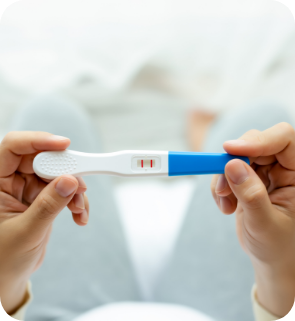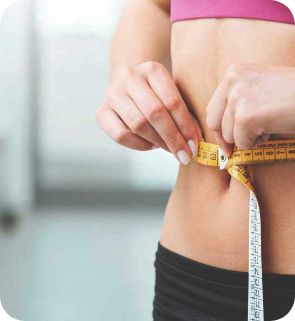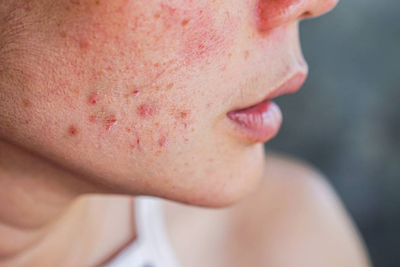
The Best Types of Exercise for PCOS
EXERCISE IS ONE OF THOSE BEHAVIOURS THAT CAN HAVE A HUGELY POSITIVE INFLUENCE ON YOUR PCOS.
But, why is that exactly? It’s because all exercise will have a hormonal & metabolic result. Put in simple terms, exercise can change your metabolic and hormonal state but it is important to note that this can be a negative or positive result. Not all exercise will have the same benefits for PCOS.
For example, for the last 30 years women have been told to stick to treadmills if they want to lose weight and that stepping foot in the weights area will have them looking like the Hulk. In reality, nothing could be further from the truth.
We now know that too much long-form cardio, like the advice given to females for decades can increase cortisol (stress) levels and result in depleted muscle mass, slowing down your metabolic rate.
TYPES OF EXERCISE FOR PCOS:
1) RESISTANCE EXERCISE
Resistance exercise is one of, if not, the most effective forms of exercise you can do for PCOS. Here's why...
Firstly, it helps to maximise your metabolism. Resistance exercise helps to build lean muscle tissue. This tissue, due to the mitochondria within it, is energy expensive, meaning that it requires an uptake in metabolism. Put simply, more muscle = increased metabolic rate. This is great news as the faster your metabolism, the easier it will be to shed stored body fat.
Studies have shown that women with PCOS have slower metabolism compared to women without PCOS. This is one of the biggest reasons why some women with PCOS find it so difficult to lose weight. The slower your metabolism is the harder it will be to achieve a calorie deficit - one of the two laws of PCOS weight loss.
The second benefits of resistance training for women with PCOS is due to the increase in muscle tissue (point 1), your body now requires more energy, it gets this energy through glucose (blood sugar), this, in turn, helps to reduce insulin resistance, which is a leading cause of symptoms such as acne, hair growth, loss, or thinning, excess weight, tummy flab, poor energy, excessive hunger & cravings.
Up to 70% of women with PCOS will have a varying degree of insulin resistance which, is one of the root drivers of PCOS so, if you do have insulin resistance, whatever you can be doing to reverse it should be one of your main focuses.
Lastly, resistance training helps to restore overall hormonal balance. Something everyone needs to know is that all exercise will have metabolic & hormonal effects. Resistance exercise especially will help to promote a 'fat burning' and healthily balanced hormonal environment.
Resistance training is things like dumbbells, kettlebells, barbells, weight machines at the gym. You should aim to complete between 10 to 16 sets per workout while aiming to complete between 10 and 20 reps each set. An example lower body workout may look like:
1) Leg Press (4 sets) (12 reps)
2) Kettlebell goblet squat (4 sets) (15 reps)
3) Walking lunges (4 sets) (8 reps each leg)
4) Leg extensions (4 sets) (15 reps)
Aim to complete between 2-5 resistance workouts each week.
2) RESTORATIVE EXERCISE
Restorative exercise is the most overlooked form of exercise for PCOS. If you’re smart, you can use restorative exercise to help create the correct metabolic and hormonal environment you need to control your PCOS as most women with PCOS suffer from low-level chronic stress, which in turn can make insulin resistance worse plus a whole raft of other PCOS symptoms.
Walking, especially outdoors has been shown to do wonders to reduce cortisol levels and in turn, improve your hormonal balance. Walking is a movement that requires energy (calories). Since energy balance (calorie deficit) is one of the two musts of PCOS fat loss you want to be doing all you can to increase your metabolic burn and the simple act of walking is great for this.
Secondly, there’s a reason that I say your mood & emotional state is the true key to achieving your goals. Walking can be an incredible way to reset, refocus, think things through, calm down, relax, improve your mood, and take control of your thoughts and feelings.
Other types of restorative exercise include yoga, stretching, pilates, or walking laps in a pool. It’s anything that gets you up, gets you moving but importantly, doesn’t get your huffing and puffing - that’s not the goal of restorative exercise.
Aim to complete between 1-4 resistance workouts each week.
3) HIIT EXERCISE
HIIT (High-Intensity Interval Training) is one of my favorite exercise types for my PCOS clients. Here's why.. HIIT releases growth hormone (GH) and cortisol together, this partnership helps activate something called hormone-sensitive lipase, which is an enzyme that helps you to start burning fat for energy. HIIT improves insulin sensitivity, which is incredibly beneficial for anyone with insulin resistance - we spoke about this before.
HIIT helps to increase metabolic rate, which will have huge benefits to help you reach your fitness goals as quickly and as enjoyable as possible. And, maybe best of all, HIIT workouts should be no longer than 20 minutes. Even 20 minutes is stretching it to be honest, I would aim to complete my HIIT workouts in 15 minutes or under.
This is because HIIT workouts are tough, it’s high intensity not just in name. You really want to be pushing yourself in these workouts for a very short amount of time. An example HIIT workout may be 4 rounds of the rowing machine.
You go all out for 20 seconds followed immediately by 40 seconds of rest, so that’s one minute in total. Once, the minute is up you repeat this, 20 seconds on, 40 seconds rest. It might sound easy but, you do this for 15 minutes and you won’t be laughing by the end of it lol.
And example of your weekly workout schedule might look like this
Monday: Resistance workout
Tuesday: Walk
Wednesday: HIIT workout
Thursday: Resistance workout
Friday: Rest
Saturday: Walk
Sunday: Rest

















Leave a comment